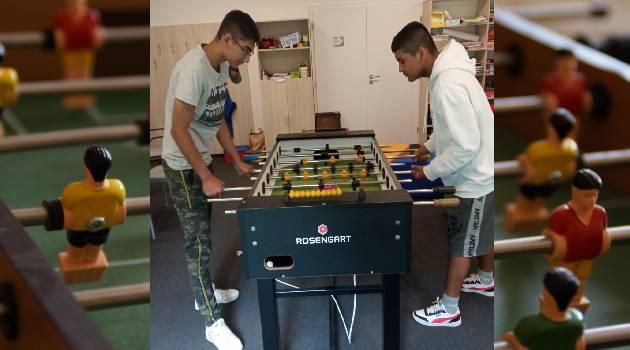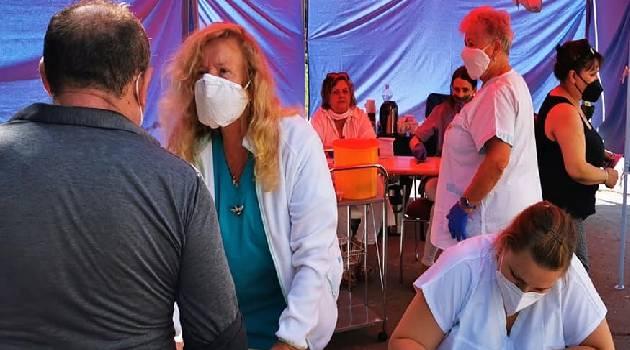Drop-in youth club in Czech town teaches fair play through foosball

“Foosball has taught us to better communicate. We don’t just rely on ourselves, but on our teammates and trainer. We decidedly also have to really concentrate on the game and uphold the rules of fair play,” a young man named Ivan tells us.
He and his friend Dan are among the best foosball players at the drop-in club in Nový Bor called Vafle (Waffles). “It’s not just about the game itself, we can make new friends while we play and learn from those who are better. Stress, adrenaline and fear of losing also play an important role. Each of us has to first learn how to lose, even if it makes us mad sometimes. We want to be better players and people, not to give up when life puts obstacles in our path,” Dan adds.
The club is run by the organization “Family at the Center” (Rodina v centru), which has been headquartered at the House of the Family’s Social Center in Křižíkova Street since last spring. The club’s social workers also visit the towns of Cvikov and Kamenický Šenov according to their clients’ needs.
The Foosball League
More than one staffer at the club has heard the comment that “all you do there is play foosball all day”, but Oldřich Prokop, the contact worker at Vafle, explains what the game means to him and the clients. “In one summer tournament the clients played 68 matches in six hours,” he explains.
“On average, two goals per match were scored on two tables, which is about 612 goals in the tournament, about two goals per minute. Divided by the number of tables, that’s one goal every minute,” he describes.
“To us, the number of goals per minute has no meaning. To our clients, though, such moments are some of the few they have ever experienced in their lives about which they can say they have succeeded with something – that they have the opportunity to prove something, to change something, to turn the score around, to assert themselves,” explains Prokop.
He likens the game and score-keeping to making everyday decisions about banal or more complex matters. “A decision is either good or it’s not,” he describes.
“We teach the players that it’s worth it to do their best and fight on, even if everything seems to be lost. Sometimes they manage to turn the score around – but if they don’t, there is no point in getting angry, or swearing, or in giving up on making another attempt,” Prokop explains.
The tournament he has mentioned is organized by “Family at the Center” and in August 2021 it was held at the Vafle club as a component of the Liberec Region’s unofficial foosball league for drop-in center players. More than 30 children competed – teams even came from the towns of Česká Lípa and Hrádek nad Nisou.
The league has not yet been launched officially due to problems with the COVID-19 situation, but it should be in full swing this year. “The idea is that each drop-in club will host one tournament,” Prokop says.
“The high point of the season usually is – and we hope will again become – the big New Year’s tournament at our club, Vafle. In 2022 that should happen for the fifth time,” he describes the plans.
Professional foosball players Oliver Ladra and Matěj Volek from the Table Goodball platform also took part in the organization of the informal August 2021 tournament. In addition to the competition, they also prepared an exhibition for the children.
“The advantage of table football is that it doesn’t really matter how much you do sports or how clever you are, what your education or skin color is, just how much time and effort you put into it,” Ladra explains. “Because the beginning is not complicated, everybody progresses quickly.”
“After that it’s just up to the player, his friends and his coaches as to how much he will improve, have fun, travel the world, or move on to something else,” the professional says. He began playing foosball at the age of 13 at a drop-in club in Prague called Vrtule (“Propeller”).
Ladra was motivated by his first loss, during which he had to climb underneath the football table. Exactly one year later he defeated the player who had bested him.
He gradually worked his way up to participate in world tournaments. Currently he is studying architecture at the University of West Bohemia.
Empathy cannot be taught
“A contact staffer is basically a kind of connector, a go-between who prepares the ground for a social worker or a different expert or institution. The client has a problem or has lost faith in institutions, he needs aid and it’s difficult for him to directly go to where he can find it. So I look for a way to reach people in difficult situations. That’s why trust is important to us,” Prokop describes his work.
According to him, it is sometimes difficult to obtain people’s trust – he considers his advantage to be his years of experience in practice, during which he has encountered the fates of many people. “Especially when they’re in trouble – drugs, social exclusion, reluctance to deal with anything. I don’t work the way a clerk, a teacher, or somebody from social services does. When I talk to them, it’s easier, as if we’re in the same boat,” Prokop says.
Not only does he make it easier for clients to contact institutions such as Labor Offices or the police, he also accompanies them when they start a new job, for example. “This is not just about problem-solving, though – it’s also about providing a space where you can come talk with people and play foosball with them, for example. Empathy is the most important thing – and that cannot be taught, it has to be experienced,” he concludes.
First published in Romano voďi magazine
